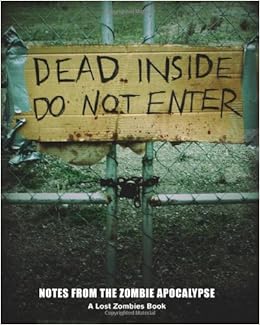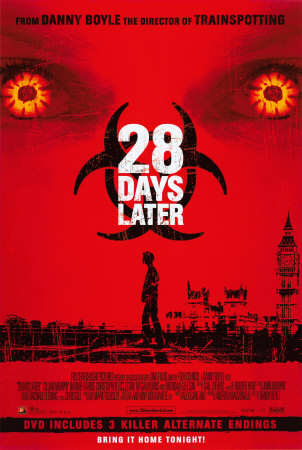Lit:
Short Fiction-
Dead Inside Do Not
Enter: Notes From the Zombie Apocalypse, by Lost Zombies
Realistically, this could have just
as easily gone under an “Other” heading as “Short Fiction.” It certainly isn’t
a short story in the way we typically think of them. In fact, it’s barely a
story at all. Unless you count all of the blanks that you are asked to fill in
on your own. What it is, however, is amazing. And unsettling. And heart-breaking.
And terrifying.
I was tempted to label this book an epistolary novella, but I felt like
that would really have been stretching each term towards its breaking point. It’s
probably more like a scrapbook than anything. When the world is ending, what
type of messages would we send? What would our last words look like as our
culture failed? Instead of letters, the book is made up of a series of notes,
written on all manner of scraps and fragments – notebook paper, birthday cards,
lotto tickets, matchbooks, torn cardboard, whatever – that were ostensibly
“discovered in a backpack […] in Northern California” following a zombie outbreak
(Editor’s Notes). This collection of found correspondence is so pitch-perfect
authentic in its depiction of the pettiness, humor, ignorance, and panic that
would define our final moments that it hurts. The notes don't seem to be linked
or arranged in any discernible way, and there is no real indication that the writers
of any of them ever knew or met one another. However, what it lacks in
narrative structure, Dead
Inside more than makes up for in gut-punch effectiveness. Some of the
letters are just close-the-book-and-sit-there-until-you-get-over-it awful. And
almost never in a gruesome or gory way. This is horror at its most cerebral,
because it makes you do most of the work. You have to buy this book (paperback, there are apparently formatting issues with the Kindle version).
Film:
Holy shit I
love this movie. As important as the Resident Evil franchise was in re-introducing zombies to the popular consciousness, 28 Days Later stands alone as patient zero of the zombie renaissance. After a decade of Scream and I Know What You Did Last Summer movies, Boyle reminded us that horror could be smart. And following years of camp and exploitation - think Dead Alive and The Dead Next Door - he sure as shit showed us that zombies movies could still be scary again.
Of course, Boyle certainly played with the form a bit to do so. For one thing, the film gives us our first look at fast zombies. I can almost hear the purists cringing, so let's get that out of the way. There is no shortage of people that don't consider 28 Days Later a zombie film - these "zombies" aren't dead or even undead (un-dead undead?), they don't seem to eat flesh, head-shots are not required to kill them, and they run for F's sake. All of that is perfectly true. And though I might find arguments against the zombie-ness of "the infected" compelling, this is without question a zombie movie. All of the hallmarks are there: contagion, ever increasing hordes of lethal beings, societal collapse, a band of survivors, even a weirdly well-lit shopping spree. Although the tweaks pull these creatures a little bit away from traditional zombie lore, these differences are instrumental in resituating the zombie as horrific to our current sensibilities. In the age of 24 hour news coverage and high-speed (hyper speed?) digital communication, slow, shambling zombies are a tougher sell as a terrifying force of (un)nature (one of the most impressive things about The Walking Dead is that it manages to convincingly present the slow-moving "walkers" as truly horrific). The now and right now generations need their zombies to move.
Similarly, shifting the monster from risen dead to "the infected" reflects what I believe is a growing skepticism of the supernatural. Following the real life horrors of 9-11, the world had less and less patience for ghouls and goblins. We wanted our monsters to be real. Where Romero scared us with the zombie not by making us believe it, but by depicting realistic reactions to inconceivable, indeed impossible, events, the Boyle zombie horrifies us because it obeys the laws of the universe as we know them. This, or something like it, could actually happen. There is a horrible horrible plausibility here that has allowed the zombie to re-take its place as our worst nightmare and preeminent monster.
Similarly, shifting the monster from risen dead to "the infected" reflects what I believe is a growing skepticism of the supernatural. Following the real life horrors of 9-11, the world had less and less patience for ghouls and goblins. We wanted our monsters to be real. Where Romero scared us with the zombie not by making us believe it, but by depicting realistic reactions to inconceivable, indeed impossible, events, the Boyle zombie horrifies us because it obeys the laws of the universe as we know them. This, or something like it, could actually happen. There is a horrible horrible plausibility here that has allowed the zombie to re-take its place as our worst nightmare and preeminent monster.


I love this movie! Also, very good thoughts about the "zombie realism". The disease in 28 Days Later has some similarities to rabies if you think about it. It's not unimaginable that a virus could alter your brain that way.
ReplyDelete